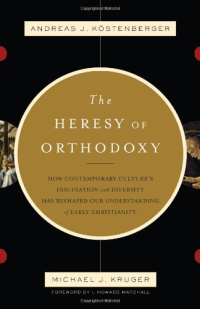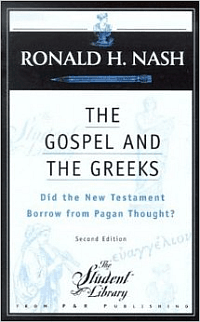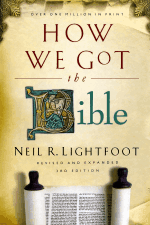Origins of the New Testament: Recommended Reading
Earlier this year as I was preparing to do the Where did the Bible Come From? seminar for the first time in English (I’ve done it more than once in Spanish), I decided to do a little reading to update/improve my knowledge on the topic. I thought some of you might be interested in a few of the books I read.
 |
The first is The Heresy of Orthodoxy. This was without doubt my favourite. The author is Michael J. Kruger, and in the book he discusses the theory that Christianity slowly emerged from a jumbled stew of ideas in the first and second century.
You’ve heard this one before – “Jesus didn’t found Christianity. It was created by political forces long after he died.” Or, “There was no one Christianity during the first hundred years of the church – there was diversity!”
This is an absolutely fascinating book, because not only does it explore the origins of Christianity, it also provides a mirror to see what our culture looks like and how it thinks. I would highly recommend this book to anyone. I can almost guarantee that it will change the way you think about the early days of the New Testament.
 |
Next, The Gospel and the Greeks: Did the New Testament Borrow from Pagan Thought?
Well, that’s the question. Was the story of Jesus really based on Greco-Roman gods and goddesses? Isn’t the story of the cross and resurrection just one among many stories of gods dying and rising?
I have to admit, the answer this book gives surprised me a little. Oh, of course I didn’t think that the Jesus story was invented out of mythical stories of the ancient world. But – wouldn’t you think that the ancient prophecies of the coming Messiah would be copied into pagan religions over the centuries? In fact, the story of the Messiah is much more different from the stories of the religions around it than I imagined.
This is not a long book, but it’s very academic – lots of “this scholar says this” and “that scholar says that” (you’ve been warned). But if this is a topic you really want to delve into, it’s a great place to start. Ronald Nash has done his homework.
 |
For a book on a much more popular level, check out Cold-Case Christianity: A Homicide Detective Investigates the Claims of the Gospels. The author, J. Warner Wallace, was a cold case detective and former atheist. He brings his knowledge of evidence and investigation to the New Testament.
I don’t always buy the author’s approach. But for a believer, the book does shed some interesting light on the evidence that we have for the New Testament. It also helps us to think through what kind of “evidence” we should expect if the story of Jesus’ death and resurrection is true.
You might be surprised to hear about some of the evidence we have for the New Testament books in those (for most of us) murky, unknown days after the apostles died.
 |
Here’s another one to check out. It’s not one of the new ones I read, but one that I read when I first put together the seminar. Although I don’t always agree with the author, it is a very short, easy-to-read overview of the topic. It’s How We Got the Bible by Neil R. Lightfoot.
This book also has the sublime advantage that it’s available in both English and Spanish (Comprendamos Como Se Formo la Biblia)!
There you go, I’ve given away a few of my sources. But of course you’ll learn a lot more about the origins of the Old and New Testaments if you take the seminar yourself someday! 😉
By the way, if you’d like to help as I continue to develop this seminar and other materials, feel free to be kind and buy me a book or two! I have my eye on a couple of related books at the moment. One is The Popular Handbook of Archaeology and the Bible, but most of all another by the author of the first book I mentioned, Canon Revisited: Establishing the Origins and Authority of the New Testament Books
. Maybe those two would be useful to you too (although I haven’t read them myself yet).
Anyway, I hope that was a help to someone!
